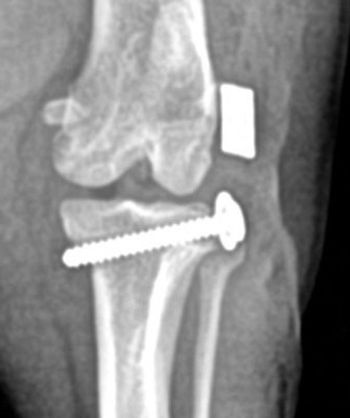
Case 5
After you discuss the urinalysis findings and recommendations with Coco's owners, they decide to try a course of antibiotics and spare her more tests and another trip to your hospital. You dispense amoxicillin (because you know it concentrates well in the urine and is effective against most gram-positive and gram-negative infections) to be given twice a day for 14 days and recommend that Coco return for a follow-up urinalysis at that time.
Coco is presented for reevaluation one week later. Her owners have been giving her the medication, and she seemed to feel better for the first few days but is urinating on the rug again. Her owners cry, "Fix it!" In other words, now they are willing to let you perform blood tests and a urine bacterial culture.
Here are the pertinent findings:
CBC
Patient values
Reference range
WBC (/µl)
16,000
4,000-15,500
-Neutrophils (/µl)
11,200
2,060-10,600
-Monocytes (/µl)
1,300
0-840
-Lymphocytes (/µl)
2,000
690-4,500
-Eosinophils (/µl)
1,500
0-1,200
Hct (%)
37
36-60
RBC morphology
Normal
Serum chemistry profile
Patient values
Reference range
BUN (mg/dl)
24
6-31
Creatinine (mg/dl)
1.4
0.5-1.6
ALP (IU/L)
232
5-131
ALT (IU/L)
30
12-118
Glucose (mg/dl)
123
70-138
Sodium (mEq/L)
145
139-154
Potassium (mEq/L)
6
3.6-5.5
Comment
Hemolysis 2+
Overall, Coco's blood test results look good. You suspect that the mild elevation in the alkaline phosphatase activity may not be clinically relevant but will monitor it. Also, the mildly elevated potassium concentration is likely secondary to the hemolysis in the sample. The CBC results are consistent with a stress leukogram.
<<
Newsletter
From exam room tips to practice management insights, get trusted veterinary news delivered straight to your inbox—subscribe to dvm360.




